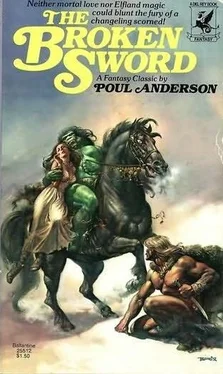Poul Anderson - The Broken Sword
Здесь есть возможность читать онлайн «Poul Anderson - The Broken Sword» весь текст электронной книги совершенно бесплатно (целиком полную версию без сокращений). В некоторых случаях можно слушать аудио, скачать через торрент в формате fb2 и присутствует краткое содержание. Жанр: Фэнтези, на английском языке. Описание произведения, (предисловие) а так же отзывы посетителей доступны на портале библиотеки ЛибКат.
- Название:The Broken Sword
- Автор:
- Жанр:
- Год:неизвестен
- ISBN:нет данных
- Рейтинг книги:3 / 5. Голосов: 1
-
Избранное:Добавить в избранное
- Отзывы:
-
Ваша оценка:
- 60
- 1
- 2
- 3
- 4
- 5
The Broken Sword: краткое содержание, описание и аннотация
Предлагаем к чтению аннотацию, описание, краткое содержание или предисловие (зависит от того, что написал сам автор книги «The Broken Sword»). Если вы не нашли необходимую информацию о книге — напишите в комментариях, мы постараемся отыскать её.
The Broken Sword — читать онлайн бесплатно полную книгу (весь текст) целиком
Ниже представлен текст книги, разбитый по страницам. Система сохранения места последней прочитанной страницы, позволяет с удобством читать онлайн бесплатно книгу «The Broken Sword», без необходимости каждый раз заново искать на чём Вы остановились. Поставьте закладку, и сможете в любой момент перейти на страницу, на которой закончили чтение.
Интервал:
Закладка:
After the grain was planted, Thorkel sailed with his remaining boys and other young men. Since they meant to seek more than one land on the far side of the North Sea, their homecoming was not awaited before late fall or early winter. Audun gazed wistfully after their ship. Yet when he turned and saw Freda beside him, he felt well repaid.
“Did you really stay just to oversee the harvest?” she asked.
His ears were hot, but he answered brashly: “I think you know otherwise.”
She glanced away and said naught.
The days lengthened and earth burst into its fullness. Warm winds, shouting rains, birdsong and deer and fish silvery in the rivers, flowers and light nights-More and more Freda felt her babe stirring.
Ever oftener, too, was Audun by her side. Now and again, in a rush of unhappiness, she bade him begone. Always his sorrowful mien brought remorse to her.
His wooing went with lame words to which she scarcely listened. She buried her face in the fragrance of the flower-bunches he gathered for her, and through the petals she saw him smile, shy as a puppy-strange, that so big and sure a youth was weaker than she was.
If they wed, it would be him that was given to her. He was not Skafloc, only Audun. O unforgotten beloved!
But the memory of Skafloc was becoming a summer that was past, recalled in a new year. He warmed her heart without searing it, and her longing for him was like a still tarn whereon sun-glints had begun to dance. To mourn without end was to be weak: unworthy of what they had shared.
She liked Audun. He would be a stout shield for Skafloc’s child.
There came an evening when they two stood on the shore, the waters murmurous at their feet and the sunset red and gold behind them. Audun took her hands and said with a lately learned steadiness: “You know I have loved you, Freda, from before that time you were taken away. In these past weeks I have frankly sought your hand. First you would not listen and later you would not reply. I ask for an honest answer now, and if it is your wish, I will trouble you no more. Will you wed me, Freda?” She looked into his eyes and her voice was low and dear: “Yes.”
XXV
In late summer the northland weather turned rainy. For days and nights on end, wind scourged the elf-hills and veiled them in lightning-blinking grey. The trolls seldom dared leave Elfheugh; bands of their homeless enemies had grown too big, well-supplied, and cunning at ambush. They slouched and slumped about, drinking, gaming, quarrelling, and drinking again. In their sullen, fearful mood, the lightest word might lead to a death-fight. Meanwhile their elf lemans had gotten so perverse that hardly a day went by without friendships broken and often lives lost over a woman.
Rumours were muttered along the dim corridors. Illrede-aye, he had fallen, and his grinning head lay in a cask of brine until battle, when it became the standard of the foe. The new King Guro could not hold the troll armies together as the old had done, and each time he made a stand he was driven back. A demon on a giant horse, with a sword and a heart from hell, led the elves to victory over twice their number.
Wendland had fallen, whispered someone, and the elves’ terrible chieftain had ringed in trolls there and spared not a one. It was said you could walk on troll corpses from end to end of that wide field.
Strongholds in Norway, Sweden, Gothland, Denmark were stormed, said another, and-somehow, though they were elf castles and built with elf skill to withstand assault-they fell as quickly as they had earlier surrendered to the trolls, and their garrisons were put to the sword. A fleet was taken in a Jutish bay and used for raids on Trollheim itself.
Allies and hirelings, such of them as survived, were falling away. A company of Shen was said to have turned on its troll companions in Gardariki and butchered them. A goblin uprising wiped out three towns—or five or a dozen-in Trollheim.
The elves were thrusting into Valland with the trolls in retreat before them ... a retreat that became a rout and finally, caught against the sea under the cromlechs and menhirs of the Old Folk, a slaughter. Tales went around the castle of that dreadful horse which trod out warriors’ lives, that weapon manyfold worse which sheared through metal as if through cloth, with never a blunting of its twin edges.
Valgard, gaunter and grimmer and curter of speech as the months wore on, sought to raise flagging spirits. “The elves have rallied,” he said. “They have gained certain powers. Well, have you never seen a man thresh about just before he dies? They spend their last strength, and it is not enough.”
But this the trolls knew: that fewer and fewer ships came from across the channel or the eastern seas, and what word they brought got worse and worse until Valgard forbade his warriors to talk freely with their crews; that the outlaw elves under Flam and Firespear grew nightly bolder, until a whole army was not safe from their sniping arrows, their swift forays on horse or by water; that the Irish Sidhe were arming as if for war; that weariness, despair, and hatred of one’s fellow spread among themselves, fed by the elf women’s sly minxiness.
Up and down the castle Valgard prowled, from its highest towers where chough and merlin nested to its deepest dungeons where toad and spider lurked, snarling, sometimes smiting and even killing in bursts of blind rage. He felt hemmed in, trapped by these misty-blue walls, by the outlaws beyond, by the waxing hosts of the Elfking, by his whole life. And naught could he do about it.
No use leading men forth. That was like fighting shadows. The slinkers would be gone; from somewhere a shaft would thunk into a troll’s back, a noose tighten around a troll’s neck, a pit with sharp stakes at the bottom open beneath a troll’s horse. Even at the table one was never sure; now and again someone died, clearly poisoned, and no bland servitor offered any clue and it might have been done by a troll with a grudge.
Cunning and patient were the elves, turning their weaknesses into strengths, biding their time. The trolls could not understand them and came slowly to fear this race they thought they had beaten.
Who were now beating them, thought Valgard bleakly. But this he kept from his men as much as possible, though he could not stop the whispers or the wrangling.
Naught could he do, save sit in Imric’s high seat draining cup after cup of fiery wine. Leea tended to him, and his beaker was never empty. He sagged in silence, eyes blurring toward blindness until he slid to the floor.
Often, however, when he was not yet too drunk to walk, he would slowly lift his great frame. Reeling a little, he made his way through the hall where the troll chiefs sprawled in spilth and vomit. He took a torch and fumbled down a rough-hewn stair. Leaning on the cold slippery wall, he got to one dungeon door and opened it.
Imric’s white body, streaked and blackened with clotted blood, glimmered in the gloom by the light of the coals below his feet. The imp tending that fire kept it ever hot, and the earl hung by his thumbs without food or drink. His belly was sunken in, his skin was taut over the arching ribs, his tongue was black, but he was an elf and this was not enough to let him die.
His slant cloudy-blue eyes rested on Valgard with the unreadable stare that, somehow, always chilled the changeling’s heart. The berserker put a grin on that fear.
“Can you guess why I have come?” he said. His voice was thick and he swayed on his feet.
No word spoke Imric. Valgard struck him in the mouth, a blow that sounded very loud in the stillness here and set him swinging to and fro. The imp shrank aside, eyes and fangs agleam in the murk.
“You know, if your brain has not shriveled in your skull,” said Valgard. “I have come before. I will come again.”
Читать дальшеИнтервал:
Закладка:
Похожие книги на «The Broken Sword»
Представляем Вашему вниманию похожие книги на «The Broken Sword» списком для выбора. Мы отобрали схожую по названию и смыслу литературу в надежде предоставить читателям больше вариантов отыскать новые, интересные, ещё непрочитанные произведения.
Обсуждение, отзывы о книге «The Broken Sword» и просто собственные мнения читателей. Оставьте ваши комментарии, напишите, что Вы думаете о произведении, его смысле или главных героях. Укажите что конкретно понравилось, а что нет, и почему Вы так считаете.











